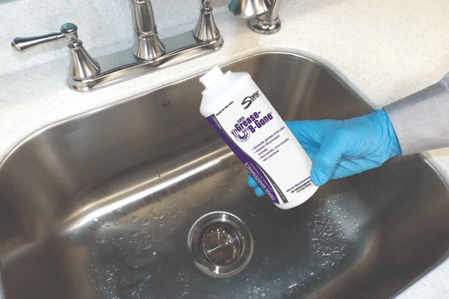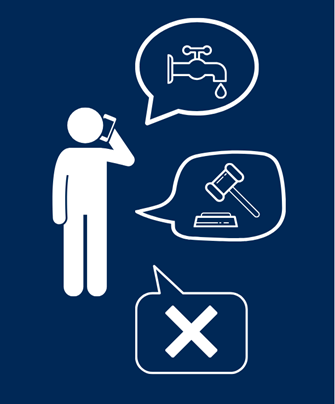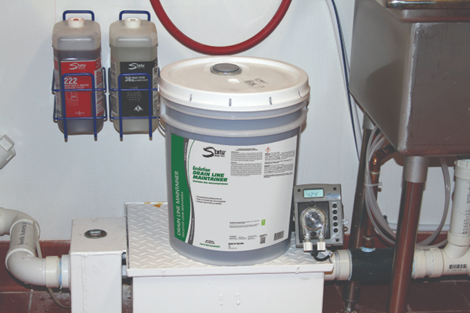Can I Use Emulsifiers in a Commercial Drain?
Can I Use Emulsifiers in a Commercial Drain?
Picture this: your staff has been complaining of odors every time they walk into the kitchen, the drain is slower than it used to be, and employees are drawing straws to see who has dish duty. You know you need to do something about this, so you start preventative drain maintenance, and it works great. The foul odors are eliminated, the sink drains faster than ever, and complaints have halted. But then you get a notice from your municipal wastewater facility—a fine for illegally putting emulsifiers down your drain or grease trap.
So, what happened? You used a drain maintainer containing emulsifiers, which are effective for clearing your drains but may face strict regulations depending on your specific region. This issue often arises when treating grease traps.
At State Chemical, we sell both emulsifying and non-emulsifying drain maintainers. We know that it can be tricky to find the best drain maintainer for you—and even more so when you need to scour the internet for answers about your local laws.
Because we know it isn’t easy to find these answers, we’ve written this guide to help you learn your local emulsifier laws. After reading, you’ll know how to find out if emulsifiers are legal in your specific region.
What is an Emulsifier?
When fats, oils, and greases (FOGs) and other organics go down your drains, they start to build up and cling to the sides of your pipes. Take the classic example of bacon grease. If you were to pour it into a can, it would solidify after it cooled down. When you pour it down your drain, it does the same thing, gumming up your pipes over time.
To solve this, you can use an emulsifier, a chemical that liquefies the buildup in your drain from materials like bacon grease. By re-liquefying the grease, it can pass easily through the pipes into the sewer without causing slow drains or blockages.
Emulsifiers are effective drain maintainers because they work so quickly. They can often even be used as drain openers in the case of slow drains because of this. They are also preferred by many users for being biodegradable and more environmentally friendly than harsh chemicals.
Why are Emulsifiers Heavily Regulated in Drains and Grease Traps?
Emulsifiers work to break down buildup in drains by liquefying items to help them pass through the pipes with the water. However, substances like bacon grease won’t be permanently liquefied by this process, and they will re-solidify further down a drain line.
If they clear your pipes, you may be wondering what the issue is. Again, let’s imagine that you liquefy that bacon grease down your drain with an emulsifier—and then so do several other facilities in town with bacon grease, peanut butter, soups, ice cream, etc. With all that buildup reforming in the sewer, there will be serious problems. Eventually, the reformation of FOGs further down the sewer system can cause backups, clogs, and other serious issues for the whole city.
It’s important to know what regulations are in place in your region so that you can avoid facing these severe sewer problems and also avoid fines. Your local municipality can trace what substances enter the sewer from your drain lines. If you’re using emulsifying agents, they’ll know where it’s coming from, and you could face fines from the municipality.
How Do I Find Out if Emulsifiers are Legal in My Region?
This then begs the question: are emulsifiers legal in your region?
To be honest, it takes a bit of digging to find out. Depending on your specific region, you may be able to learn about emulsifier regulations on your local department of public utilities’ website or through any records of local laws available online. Sometimes, they are referred to as pre-treatment policies.
However, in most cases, the quickest and surest way to find these local laws is by contacting your city’s department of public utilities to ask directly. Yes, this is a pain, but it’ll save you time in the long run when you don’t have to worry about fines or finding a new drain maintainer.
Biological Drain Maintainers as an Alternative to Emulsifying Drain Maintainers
If emulsifiers are illegal in your area—or if you don’t want to worry about finding out if they are—the good news is that biological drain maintainers are effective alternatives to emulsifying drain maintainers. However, you’ll need to ensure that your chosen biological product does not also contain emulsifiers since the two categories are not always mutually exclusive.
Biological drain maintainers are composed of bacteria, which feed on the organic buildup in your drain. The bacteria digest the organics and turn it into CO2 and H2O (air and water). This means there is nothing left to resolidify or reform. The bacteria will keep working in your pipes as long as they have a food source and livable conditions.
Bacteria will not effectively work in your drain if exposed to disinfectants or sanitizers, which can kill them. Also, bacteria may take 24–48 hours to start working, whereas emulsifiers can start clearing buildup in as few as 10 minutes. Keep these limitations in mind, but if you cannot use emulsifiers, bacteria is an effective alternative to prevent buildup in most situations.
Next Steps: Contact Your City’s Department of Public Utilities for Local Regulations
Local regulations can be tricky to follow, especially when the specific rules aren’t always evident. Now, you know that you can get straight answers on whether you can use emulsifying drain maintainers by contacting your city’s department of public utilities. From there, your next step is to consider exploring how much a drain care agreement with State Chemical costs.











